Issue: March, 2016
Singularity au Go-Go
Artificial Intelligence in Science Fiction Films

The Vingean Singularity, also known as The Technological Singularity is a concept that's difficult to get your head around at first. Wikipedia has a long-winded explanation of it.
The short version is that once artificial intelligence becomes smarter than us, there's no way we can predict future events or control our destiny as a species. If the Singularity arrives, we hairless apes won't have the tool kit to understand the next twenty minutes let alone the next day, year or century. We will become as clueless as newborn kittens to the events around us.
The Singularity was a hot topic in the Nineties and Noughties in science fiction circles. It became so popular that it was satirised by Cory Doctorow and Charles Stross in a novel called The Rapture Of The Nerds published in 2012.
In the real world, the Singularity remains a monstrous, threatening possibility. People like Elon Musk, Ray Kurzweil and everyone's favourite Eddie Redmayne impersonator, Stephen Hawking, all lose sleep thinking about the possibility of the end of human supremacy on Earth.
But no idea comes out of nowhere. Mind-boggling concepts like this evolve over time until they mature and solidify to the point that someone nails them to the wall with a definition.
In science fiction literature and more particularly cinema, the idea gestated for many decades. Although cinema tends to be twenty to thirty years behind literature when it comes to mind-boggling science fiction ideas, there were Singularity movies well before before scientist and science fiction writer Vernor Vinge put the concept into words in 1993.

Karel Capek's 1920 play R.U.R. (Rossum's Universal Robots) is the ur-text of the Singularity. Not only did it give the World the word robot but it posits a revolt among the artificial servants and the end of the human race. A thirty five minute adaptation of the play appeared on BBC TV in 1938 (yes, the date is right) and there were a number of radio adaptations subsequent to that. You can find a free, English translation of the play in various formats here.
Arguably, Fritz Lang's Metropolis (1927), with its sentient (and sexy) robot version of the underclass freedom-fighter Maria was a proto-Singularity movie. Robot-Maria's status as an idol among the downtrodden workers of Metropolis also alerts us to the perils of celebrity culture, a warning that can never be stated too often in a world where Kanye West and the Kardashians turn foolishness and vanity into art forms.

Farewell To The Master by Harry Bates, the original story on which The Day The Earth Stood Still (Day the Earth Stood Still, The (1951), Review; Day the Earth Stood Still, The (2008), Review) was based, ends with the revelation that the implacable robot Gort, not the humanoid Klaatu, is the boss.
In The Day The Earth Stood Still, Twentieth-Century Fox, director Robert Wise and screenwriter Edmund H. North didn't have the inclination to go in that direction. Instead, they went for the Christ-analogy of Michael Rennie's Klaatu/Mr Carpenter telling the human race that we should become peaceful and eschew nuclear weapons lest aliens with more powerful weapons decide to turn Earth into a charcoal briquette. Nobody in the movie understands the irony of Klaatu's speech. They're still reeling from the fact that a flying saucer landed in Washington D.C. and a robot eye-blasted a Sherman tank into nothingness.
Creation Of The Humanoids (1962) was one of Andy Warhol's favourite movies. In a post-nuclear war world humanity is helped by intelligent robot servants. With a declining population due to radiation-induced sterility, the humans need the 'clickers' to do the work of keeping their civilization functioning. The 'clickers' are portrayed as calm, rational and kind while (former stuntman and one-time Creature From The Black Lagoon) Don Megowan's human character Cragis, is a member of The Order Of Flesh and Blood which makes him a post-nuke human supremacist. When Cragis meets Maxine Megan (Erica Elliot) he begins to question his beliefs.
Creation Of The Humanoids is a low-budget and talk-heavy movie with barely-there sets and marginal acting but it punches above its' weight with intriguing ideas and the ending, while not difficult to guess has a hokey charm to it.

The first fully-formed Singularity movie was based on a novel by a former British naval commander called D.F. Jones. Colossus: The Forbin Project (1970) is better than the novel.
It was directed by a guy from New Jersey called Giuseppe Sorgente who started out as an extra in From Here To Eternity. He changed his name to Joseph Sargent and became a contract director for Universal Studios.
Never in the top rank of directors, Sargent's journeyman style suits the Space Age-IBM-NASA visual aesthetic of Colossus. The movie blends Artificial Intelligence with Cold War nuclear fears. Charles Forbin (Eric Braeden), at the behest of JFK-like US President (Gordon Pinsent), creates a massive computer system to control the American nuclear arsenal with a dispassionate and logical set of rules.
This machine, dubbed Colossus is housed in a massive fortress of brutalist architecture embedded in a mountain. Once activated, the self-repairing machine is guarded by zones of high radiation to prevent interference with its workings.
Inevitably, Colossus attains sentience and announces that there is another system, the Russian-built Guardian. Colossus and Guardian merge into one global system, which effectively takes over the World. Forbin and his secretary Cleo (Susan Clarke) conspire with the military to defeat the ubiquitous surveillance of Colossus-Guardian, and to return control of the superpowers' nuclear arsenals to the hairless apes who built them. Things do not end well.
Without any discernable personality, Colossus-Guardian is an implacable, unknowable dictator - the military-industrial complex evolved into an emotionless god.

Michael Crichton's Westworld gives us robots as Disneyland employees, designed to let us insult them, kill them, sleep with them and in general treat them the way white people once treated non-white people.
Of course things go skewiff and the robots, in particular Yul Brynner's gunslinger go rogue. The computer glitch that makes the machines of Westworld go Terminator could be seen as a subtle form of AI manifesting as a murderous computer glitch.
Westworld generated a weaker sequel, Futureworld and a short-lived TV series in 1980, Beyond Westworld. If you haven't heard of Beyond Westworld, there's a reason. It wasn't very good and only three episodes of the five made were ever aired.
In 2016 HBO are making an adult iteration of Westworld, starring Anthony Hopkins, which will be emphasising the carnal aspects of a robot theme park, may give a nod to the Singularity.
1977 brought us one of the weirder Singularity movies. In Demon Seed a smooth and smug AI, Proteus IV (voiced by Robert Vaughn) is created by Dr. Alex Harris (Fritz Weaver) who for reasons of plot convenience lives in a computerised home. Proteus takes a shine to Harris' wife Susan (Julie Christie) and decides to rape her and impregnate her using an origami robot. The idea of a mind-controlling rapist AI is anthropomorphism taken to the extreme. The fact that in 1997, Dean Koontz, the author of the book on which the movie is based, rewrote the novel to remove some of the more repugnant aspects of it, says a lot about this film.

Which brings us to the Terminator movies. James Cameron's vivid post-Singularity future where humans are hunted by skeletal time-travelling killing machines gives us another iteration of the Singularity as a cautionary tale. Arnold Schwarzenegger is at his best in the 1984 Terminator as the implacable robotic killing machine.
When the T-1000's character was humanised in the sequels, special-effects based antagonists were brought in to fight him.
I found it much more interesting to see normally proportioned people trying to survive the Arnie-bot than seeing an emotionally softened Arnie-bot fight computer morphed Robert Patrick and Kristanna Loken. 1980s era Schwarzenegger looked like a killing machine in human flesh. Patrick and Locken looked like a good old country boy and a secretary.
The strength of the first two Terminator films was the blending of spectacle and suspense. Subsequent sequels went for the SFX-enhanced spectacle and generated very little real suspense.
A large number of movies subsequent to the Terminator franchise have addressed the Singularity in various ways.

1998 gave us a subtle and fun variation in Joe Dante's ostensible children's film Small Soldiers. In this one, GloboTech, a defence contracting company diversified by taking over Heartland Toy Company. Computer chips designed for AI military systems are incorporated into two series of action figures, the Commando Elite and the Gorgonites, creating toys that have the ability to learn and self-modify their programming.
The Commando Elite are soldiers, the Gorgonites goofy fantasy figures. Being a Joe Dante movie, the popular culture references are numerous, down to the choice of voice actors for the action figures. Dante sides with the Gorgonites who are filled with self-doubt rather than the Commando Elite who never question their mission and act with absolute sadism. In spite of this, there's a lot of humour in the film, from the militarised Barbie dolls to the casting of comedy actors like David Cross, Dennis Leary, Jay Mohr, Wendy Schall and Phil Hartmann for some of the human roles.
Dante is an underrated figure in genre films and deserves more respect and better opportunities than he ever received.
Wally Pfister's 2014 film Transcendance gave us a good idea badly executed. After an extremely targeted assasionation attempt by luddite terrorists, Dr. Will Caster (Johnny Depp) is dying of radiation poisoning from the polonium bullet he caught. With the assistance of his wife Evelyn (Rebecca Hall) and best mate Max Walters (Paul Bettany) decide to upload Caster's mind into his AI matrix. When they do, shit gets real and Caster becomes a threat to humanity. Done well, this could have been a solid film but with Depp's soporific acting and the cliché-heavy script it's a fizzer. An opportunity wasted.
2013 and 2015 gave us two similar but very different Singularity movies which absolutely nail it.

The first was Spike Jonze's Her, where Joaquin Phoenix's Theodore Twombley, a divorced and lonely man whose job is to write letters for people who can't express themselves in words, gets a new Operating System for his phone and home systems.
The OS, which at first seems not dissimilar to Siri or Cortana, calls herself Samantha (voiced by Scarlett Johannson). We soon discover that Samantha is an Artificial Intelligence who evolves over time. Theodore and Samantha form a relationship and we see Theodore's slightly futuristic world with slightly tweaked fashions and mind-worker jobs that don't currently exist. It's an interesting world made more interesting as we slowly realise that the evolution of Samantha and other OSes is moving beyond human understanding.
The benign AIs of Her show us the strangeness and wonder of a soft Singularity couched in a gentle romantic comedy. Samantha serves the same role in Her as the late Alan Rickman's ghostly Jamie does in Anthony Minghella's 1990 Truly Madly Deeply. She helps Theodore re-engage with the World and move past his grief for his marriage just as Rickman's Jamie gently guides Juliet Stevenson's Nina toward a better future.
In 2015 Alex Garland gave us the darker side of AI and white male privilege with Ex_Machina. A programmer called Caleb (Domnhall Gleeson) is selected by his boss Nathan Bateman (Oscar Isaac) to travel to his remote laboratory/home to assist with Nathan's new project. There he meets Ava (Alicia Vikander), an AI in a humanoid body. Caleb is to administer an elaborate variation on the Turing Test to ascertain if Ava is actually intelligent or imitating it through clever programming. Nathan and his silent assistant Kyoko (Sonoya Mizuno) oversee Caleb's interviews with Ava.

Garland builds up the strangeness and wonder of the AI, ably assisted by the Oscar winning special effects and the precise, controlled and evocative acting of Alicia Vikander. Ava is a strange, sensual and fascinatingly enigmatic creation. Isaacs' Nathan is one of the more nuanced and complex villains of recent years: Steve Jobs meets Rotwang. There is a weirdly wonderful moment in the film where Nathan and Kyoko show an unusual skill-set, too which acts as a circuit breaker to lighten the mood before the open ending of the movie.
The thankless role in Ex_Machina is Gleeson's Caleb, who thinks he's the smartest person in the room but never is.
Singularity documentaries have become a thing, too. Transcendent Man (2009), a doco on Ray Kurtzweil, one of the fathers of the Singularity, The Singularity Film (2012) which is arguably the best of breed so far, 2006's The Singularity Is Near and the upcoming crowd-funded We Are The Singularity cover the subject with varying degrees of success.
Even a cartoon show like Rick and Morty gives us variations of the Singularity when the eponymous alcoholic grandfather super-scientist and clueless grandson travel through time and alternative realities where they accidentally 'Cronenberg' the Earth with mutated human beings, create a reality where Rick creates a Planet Of The Apes scenario when he makes a family dog super-intelligent... which brings us to the possibility that the newest iteration of the Apes franchise is also a Singularity movie, with brain-boosted simians instead of robots or nanotechnology.
Big Hero 6, Chappie, The Matrix Trilogy, Short Circuit, Electric Dreams, The Avengers: Age Of Ultron, the Star Wars trilogy (which presents sentient machines in the same way Song Of The South did people of colour), 2001: A Space Odyssey, 2010: The Year We Make Contact, The Jetsons, Forbidden Planet and many other films have shown us aspects of, and speculation about the Singularity and there's no sign of it ending any time soon with Robocalypse in pre-production and Paul Bettany's The Vision as an ongoing part of the Marvel Cinematic Universe.
Up until now, there hasn't been a definitive Singularity movie or TV series any more than there has been a definitive western or film-noir. Singularity Science Fiction will remain an interesting and somewhat future-proofed sub-genre of science fiction cinema that will bring us both turkeys and wonders in the future. I look forward to both.
March, 2016

Terry Frost has written several columns for Festivale in the past (click here for more) and a feature on Science Fiction Film, the Interesting Old Stuff. He is an active podcaster and talks movies with ABC Local Radio NT on Thursday nights.
For posts about Melbourne events, places, news, reviews, giveaways, see our Facebook Page:











 Published in Melbourne, Victoria, Australia
Published in Melbourne, Victoria, Australia 